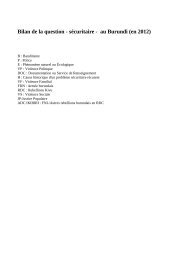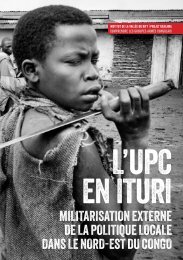You also want an ePaper? Increase the reach of your titles
YUMPU automatically turns print PDFs into web optimized ePapers that Google loves.
MOHAMED ELJARH<br />
the fighting in Syria returned to Libya and helped set up IS in Darnah<br />
and Benghazi.<br />
Following the initial pledging of allegiance to IS and its leader Abu Bakr<br />
al-Baghdadi, and after much speculation about IS’s intentions for Libya, it<br />
became evident that IS’s leadership recognized the strategic importance of<br />
Libya to its overall project. Its wealth, location, and the immense amount<br />
of weaponry still present there following the overthrow of Qadhafi made it<br />
a source of great potential, as did the fragile state of the country, which suffered<br />
from polarization and infighting among various groups. A document<br />
circulated among IS supporters in January 2015 was proof of IS’s ambitions<br />
for Libya as a strategic gateway for its project, or at least as a fallback option.<br />
The link between IS’s central leadership in Syria and Iraq and its newly<br />
established province became more evident in early 2015. The leadership dispatched<br />
some of its most senior fighters to Libya to help strengthen the group’s<br />
presence there and establish its first strongholds outside of Syria and Iraq:<br />
• Abu Nabil al-Anbari (Wissam Najem Abdul Zayed Zubaidi), an Iraqi<br />
national, was one of the military commanders who led the group’s<br />
expansion in Iraq. He was reportedly killed in a U.S. airstrike on Darnah<br />
on November 14, 2015.<br />
• Abu Habib al-Jazrawi, a Saudi national, reportedly filled the role of the<br />
wali in the city of Darnah very early on.<br />
• Abu al-Bara al-Azadi, a Yemeni national, was reportedly killed in an<br />
Egyptian airstrike in February 2015.<br />
• Turki al-Binali (Abu Sufyan al-Salami), a Bahraini national, was considered<br />
the spiritual leader of the group. He was active in Syria and Iraq,<br />
delivering lectures and lessons in IS-held territory. He was also spotted<br />
in Darnah and later on in Sirte.<br />
Both in Darnah and Sirte, IS’s new strongholds were quick to establish sharia<br />
courts, police (hisba), and other administrative departments to oversee the<br />
radical social reengineering of local communities that fall under IS’s control,<br />
not only through mandatory religious programs, but by instilling fear<br />
in them through public punishments, including execution and crucifixion.<br />
Furthermore, the link between IS’s central authority and its followers in<br />
the Libyan province is evident in the propaganda material disseminated by<br />
the group; this was clearly demonstrated by the report in IS’s online magazine,<br />
Dabiq, on the killing of the twenty-one Egyptian Copts in Sirte on<br />
8






